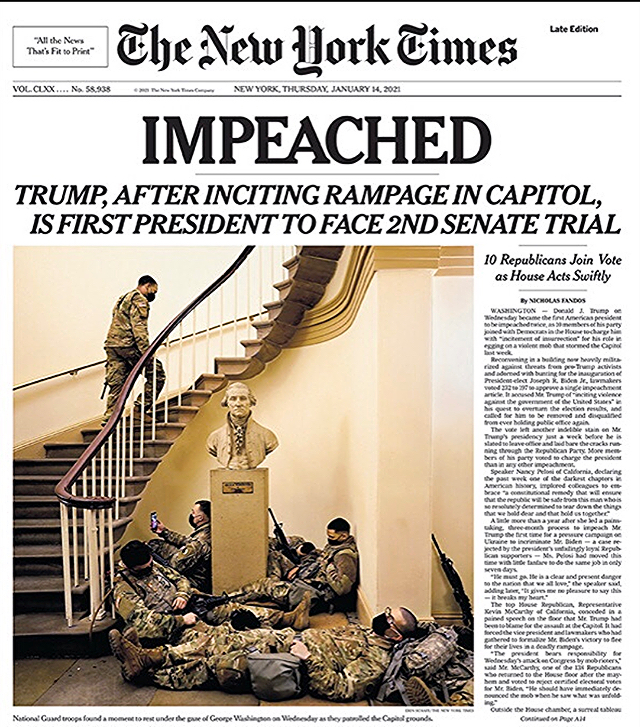That madman shot of Armie Hammer is like that 1969 Life magazine photo of Charles Manson. It’s going to appear again and again, and is obviously going to make things worse for the poor guy. Right now he’s being sliced and diced by social media carnivores. In a text he called himself a sexual “cannibal” — obviously an allusion to carniverous cunnilingus. He’s apparently a “dominant”, and yes, his [allegedly] stated appetites sound like the voltage was turned up too high. So yeah, he’s on the pervy side. But haven’t his affairs and assignations been consensual? What did he do to deserve to be ripped apart like an impala being disembowled by wild dogs? Who’s behind this? What’s the motive?
Regina King‘s One Night in Miami, which I saw and reviewed four months ago, is now streaming on Amazon Prime. I haven’t re-watched it, but it’s best to trust your initial reaction. Here’s what I said:
Variety award-season columnist Clayton Davis was apparently floating on a cloud while writing his review of Regina King‘s One Night In Miami, calling it “the first solid Oscar contender to drop in the fall festival circuit.”
All right, let’s calm down. Yes, this is a respectable, well-acted film in a disciplined and concentrated sort of way. But as interesting as it is and as admired as King may be for doing a better-than-decent job, One Night in Miami is basically a stage play and that shit only goes so far.
I don’t know how to explain it in so many words, but I somehow expected that a film about a February 1964 meeting between Cassius Clay, Malcolm X, Jim Brown and Sam Cooke in a Miami hotel room would amount to something more than what this movie conveys.
Playwright Kemp Powers has adapted his 2013 play about African American identity in the ’60s.The result is not great or brilliant, but it’s good enough in terms of observational fibre and social relevance, or at least the second half is. But the fact that it was directed by King doesn’t make it any more or less than what it actually is.

And for a film that largely (65% or 70%) takes place in a single hotel room, it visually underwhelms. Tami Reiker‘s cinematography doesn’t match the high water marks of Boris Kaufman‘s one-room lensing of 12 Angry Men or Glen MacWilliams‘ cinematography for Hitchcock’s Lifeboat.
Denzel Washington’s titular performance in Spike Lee‘s Malcolm X was a tougher and more resolute dude than Kingsley Ben-Adir‘s version. Malcolm won’t stop beating up on poor Sam Cooke, and he seems weak when he asks Cassius (“Cass”) to join him in breaking with Elijah Muhammad. And he weeps! Just not the solemn, heroic figure that I’ve been reading about all these years. And wasn’t he wearing that carefully trimmed Van Dyke beard in ‘64?
Good moment: When Cooke criticizes Malcolm for reacting in a cold, racially dismissive way when JFK was murdered (“The chickens coming home to roost”). Cooke says his mother cried over the news, and Clay says his momma cried too.
Leslie Odom, Jr. is quite good as Cooke, but I didn’t believe an early scene at the Copacabana in which the snooty white clientele reacts to Cooke’s singing with derision and rudeness. In ’64 Cook was known all over as a major-league crooner who had released a cavalcade of hits going back to ‘57. No way would an audience of uptown swells treat him like that. Even if they didn’t like his act, the middle-class politeness instinct is too embedded.
I felt the same contemptuous attitude toward whiteys in the Copa scene that Ava DuVernay showed when she invented that Selma scenario in which LBJ told J. Edgar Hoover to tape-record MLK’s sexual motel encounters in order to pressure him into not pushing for the Voting Rights Act. You’ll recall how Joseph Califano called b.s. on that.
The postscript reminds that Malcolm X was murdered by gunfire a year later, but it ignores Cooke’s death in Los Angeles less than a year later. That tells you that King is a bit of a spinner — she didn’t want to leave the audience with a downish, mystifying epilogue. But it happened.
This is currently the most emotionally soothing photo in my system. I’d like to be able to visit this region of Vietnam every April or thereabouts. If I was ordered to live somewhere in Asia I’d park it in Hanoi but come here for occasional week-long stays. Two other far-from-the-madding-crowd downshift comfort spots: (a) Lauterbrunnen, Switzerland; (b) Knocklong, Ireland (near Limerick).

This looks like Central Vietnam, south of Hue, northwest of Danang…something like that. Or maybe it’s farther south…what do I know?

Flimsy and debt-besieged even before the 2016 election, the Trump empire is in even worse shape now.
After the 1.6 Capitol insurrection and yesterday’s Impeachment 2.0, all the big corporate interests consider Trump a pariah and are cutting ties. In terms of his present financial interests (hotels, golf courses) he’s starting to look like a serious loser. Or, if you will, a dead man. No Twitter, no nothin’.
Not to mention the IRS hounds and the coming prosecutions from New York State Attorney General Letitia James and Manhattan District Attorney Cy Vance. If Trump were to liquidate everything he owns, could he even pay off the alleged $400 million he owes? Maybe but then what?
Yes, he could theoretically build a media company upon his 75 million looney-tune rightwing followers, but one way or the other he’s going to spend the rest of his life in court, and gradually — here’s the real killer — the news media is going to lose interest in him.
How much longer will he live with his fast-food diet and all? Ten years? Less?
Incidentally: I like Secular Talk‘s Kyle Kulinski, who’s pretty sharp, can think clearly on his feet and as of last summer had 848,000 YouTube subscribers and roughly a half-billion YouTube views.
But where’s the curtain liner? And what about my Reverent Runt bath mat, for extra traction while showering? Barry Lyndon soap-on-a-rope comes in four different fragrances — sandalwood, Irish tree moss, green aloe and Turnberry spice. And for women, a delicate Lady Lyndon semi-transparent bath shawl for wearing in the bath or under the shower as women of social distinction never bathe naked.
“It was in the reign of George III that the aforesaid personages lived and quarreled; Good or bad, handsome or ugly, rich or poor, filthy or showered, they are all equal now.” — Posted earlier today on Facebook by director-producer-screenwriter Larry Karaszewski.
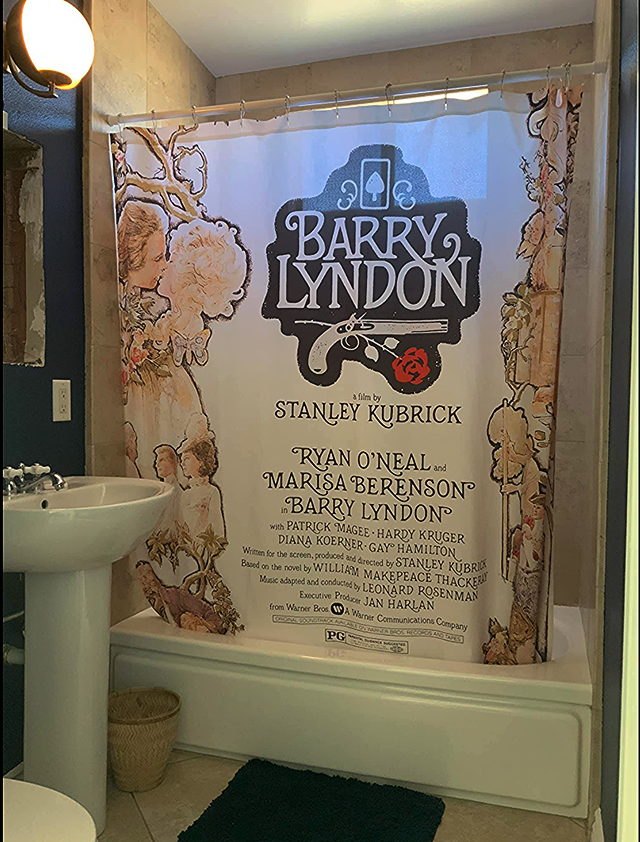

For the first 45 or 50 minutes of Kathryn Bigelow‘s The Hurt Locker, it’s all tension and anxiety, tension and anxiety. Plus a little tension and anxiety.
It’s basically about Jeremy Renner‘s Sgt. James, a bomb-defusing expert but more fundamentally a danger freak and an adrenalin junkie. He doesn’t like flirting with the possibility of being blown to bits — he loves it, or at least the feeling of momentary triumph when he overcomes that threat.
The other two members of the bomb-defusal team — Anthony Mackie‘s Sgt. Sanborn and Brian Gerahty‘s Specialist Eldridge — don’t love flirting with death and pretty much hate James’ recklessness, and there’s the basis of the dramatic conflict.
And then David Morse‘s Colonel Reed arrives on the scene and offers a little comic relief. He’s not appalled by James’ hot-dog behavior — he’s half-amused, perversely tickled, tee-hee. “Well, that’s just hot shit,” he says to James, grinning and beaming like a fan. “You’re a wild man…you know that?”
My favorite moment comes when he asks James how many bombs he’s defused, and James tries to deflect. Reed is having none of it: “Sergeant, I asked you a question.” What follows is pure hilarity, pure relief. Every tension-wracked film needs a guy like Reed to pop in sooner or later.
Said this ten years ago, saying it again: The Hurt Locker needed to end with Renner staring at the rows of cereal boxes in the supermarket. We didn’t need to see him go back to Iraq. The cereal boxes said it all.
Wayne Wang‘s Slam Dance (’87), a sultry mystery noir, was a critical bust and a financial wipeout — it cost a modest $4.5 million to shoot, but only managed a lousy $406,881 gross. The alleged bad guy was producer, screenwriter and costar Don Keith Opper, who reportedly interfered with Wang to such a degree that, according to the Wiki page, Wang tried to get his name taken off the film.
And yet Slam Dance got two things right — (a) the pistol-hot one-sheet featuring costar Virginia Madsen in a skin-tight black gown, and (b) using a music video of Tim Scott McConnell‘s “High Hopes”, a much better song than Slam Dance was a film, for promotional purposes. McConnell wrote the tune in ’85. Bruce Springsteen released a version as part of a same-titled album in 2014.
Which other films were promoted with a music video that was arguably better or at least more engaging than the movie itself?
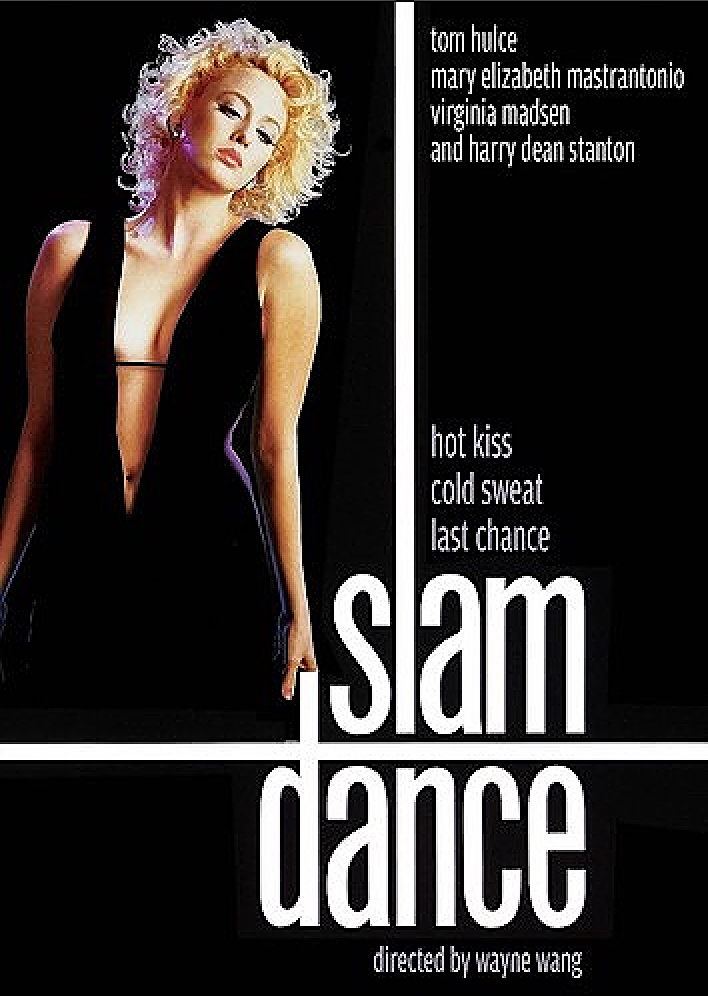

THR‘s Scott Feinberg has posted an interesting “Awards Chatter” discussion with Best Actor contender Ben Affleck, whose performance as a recovering alcoholic in Gavin O’Connor‘s The Way Back is arguably his best performance ever…certainly his most life-reflecting by way of naked revelation.
Standout Affleck quote: “One of the things that happened to me was that I was forced to really honestly look at myself — my failings, my shortcomings, my character flaws — to find accountability, to not hide or run from feelings. And I developed a much greater access — this sounds very actory, so forgive me — to the full range of my emotions. I have had so many more life experiences and so much more to bring to a performance. Now, I feel like a much, much better actor than I’ve ever been. And I love it.”
The Way Back (Warner Bros., 3.6) was the last film I saw in a screening room before the pandemic hit. Here’s my 3.4.20 review, titled “Sincere Muted Respect for ‘The Way Back'”:
Last Friday I mentioned something I’d heard about Gavin O’Connor and Ben Affleck‘s The Way Back, a sports redemption drama about an alcoholic basketball coach. The thing that I heard (and that I shared) is that “it’s not Hoosiers.” I saw it the night before last, and it isn’t.
But you know what? In some ways Brad Inglesby‘s script is as dramatically reputable as Hoosiers — it’s rooted in a real, recognizable, occasionally unfair world of fundamentally decent but occasionally flawed peopleGavin O’Connor’s . And O’Connor’s direction is respectably lean and dutiful, pared-to-the-bone and bullshit-free.
And Affleck’s lead performance…well, he certainly knows what it’s like to be a middle-aged drunk, doesn’t he? That authority and experience filter through. The cynicism, the swearing, the hair-trigger eruptions, the lethargy. It’s acting, of course, but without “acting.” And that’s no small feat.
And the film itself is definitely decent. Not levitational but sturdy. I’m giving it an eight. Not an eight-point-five but an honest eight.
Because, for the most part, it isn’t Hoosiers. It’s a step-by-step story about a guy with a serious problem, and while it’s embroidered and punctuated with basketball issues and strategies and the usual ups and downs, it doesn’t turn on the game. It turns on what Affleck’s character, a divorced construction worker who gives up boozing after taking a coaching gig for the same South Bay basketball team that he gloriously played for in the early ’90s, does about his addiction.
In all my years of searching for color shots of significant films playing in Times Square during the ’40s to mid ’60s heyday, I’ve never come across a full-color snap of the Capitol marquee during the run of From Here to Eternity. Until today, that is. An eventual winner of eight Oscars (Best Picture, Best Director / Fred Zinnemann, Adapted Screenplay, Supporting Actor / Frank Sinatra, and Supporting Actress / Donna Reed), Eternity opened at the Capitol (B’way and 51st) without a premiere and on a sweltering weekend to boot. Plus the Capitol had no air-conditioning.
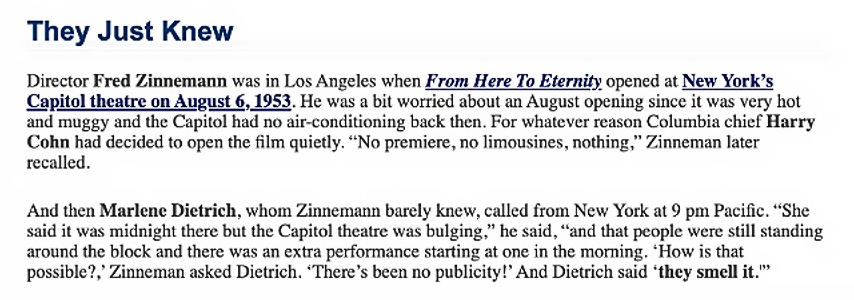
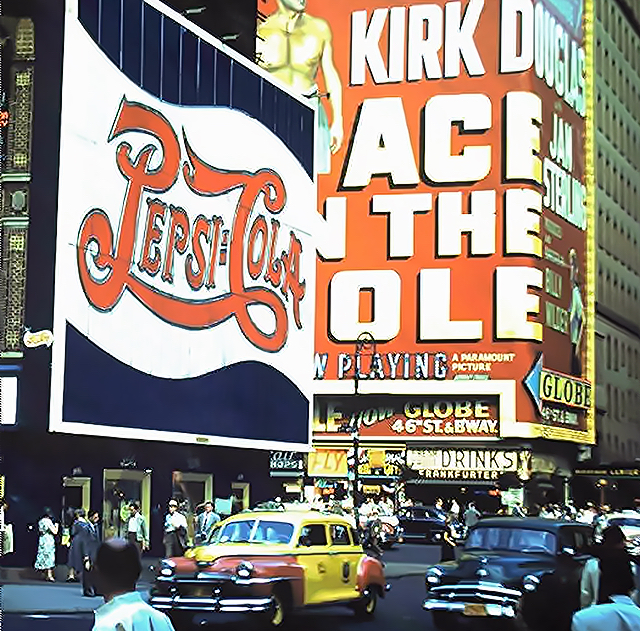
If I remember correctly, Kirk Douglas never once takes his shirt off in Billy Wilder‘s Ace In The Hole (’51). He was well-known, of course, for displaying his brawny physique in Mark Robson‘s Champion (’49), which had made him a star two years earlier. So the Ace in the Hole billboard marketing guy said “fuck it, let’s try and sell this cynical, bitter film about heartless journalism as a Champion reboot.”
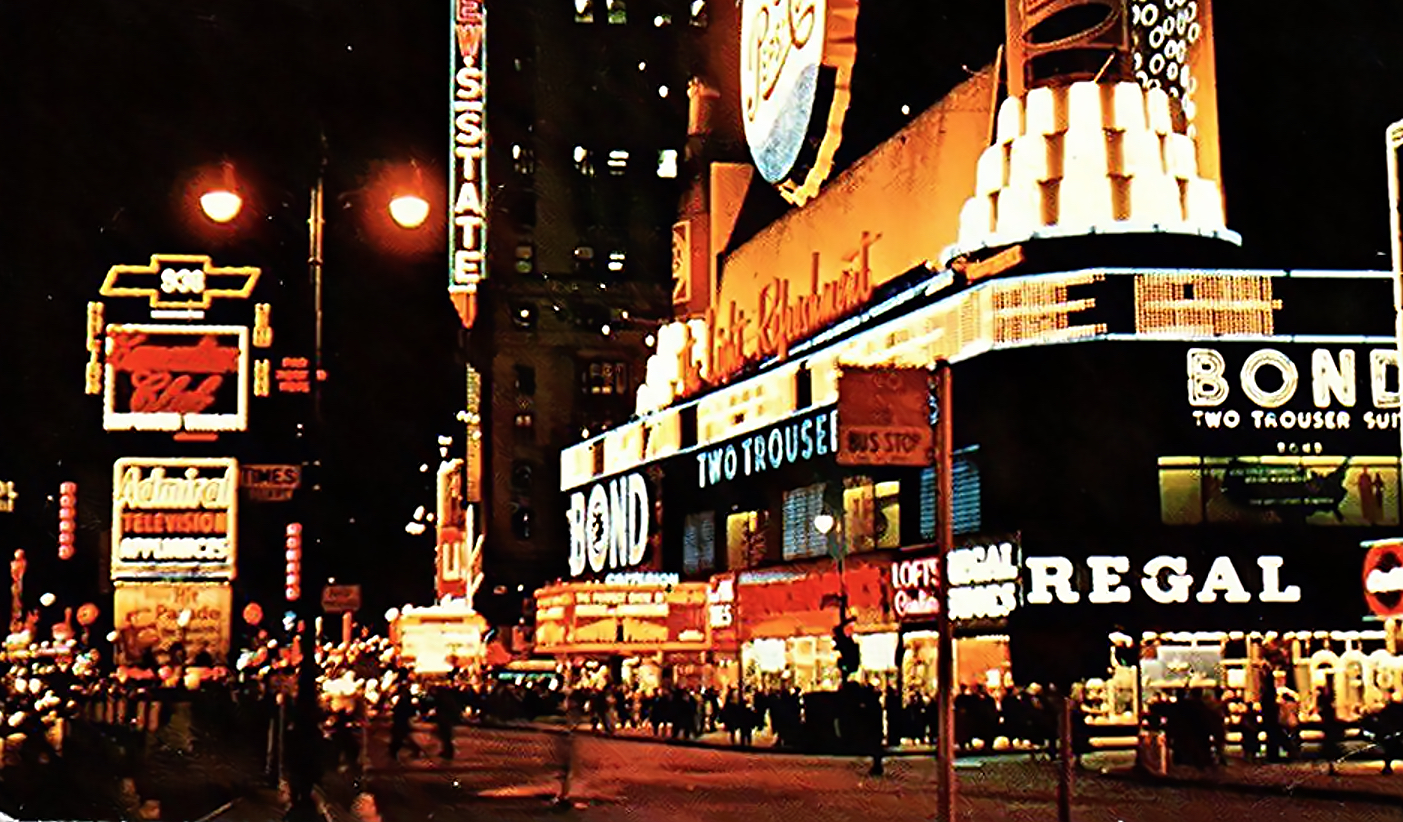
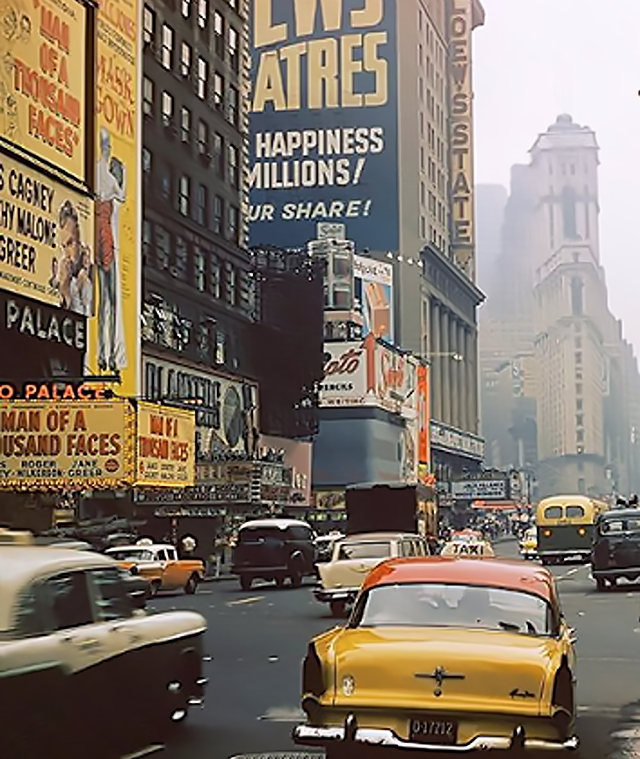
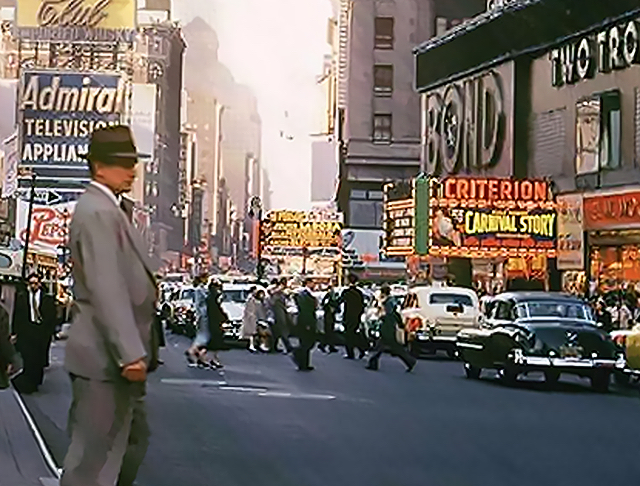
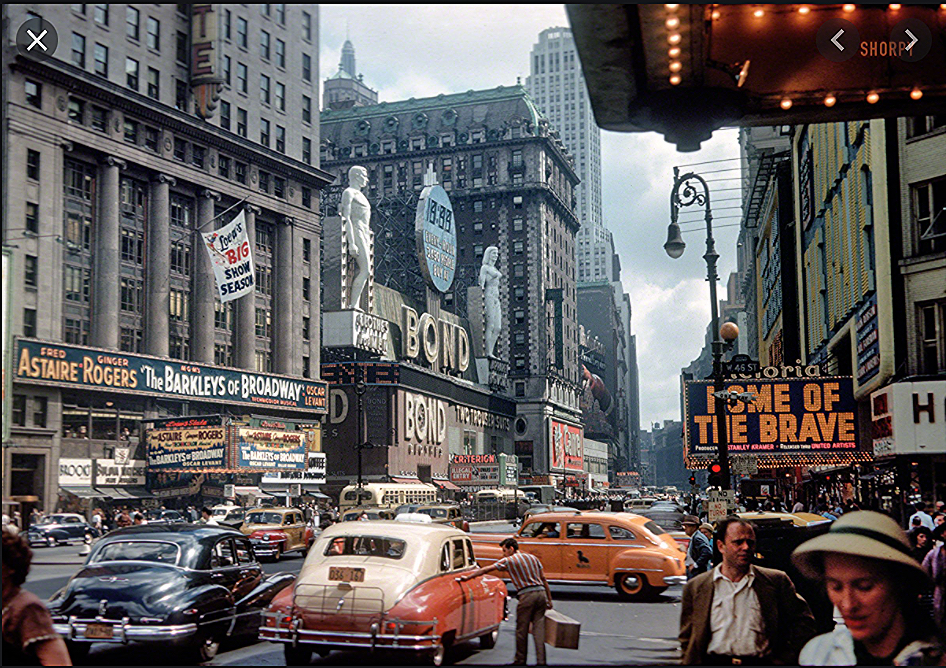
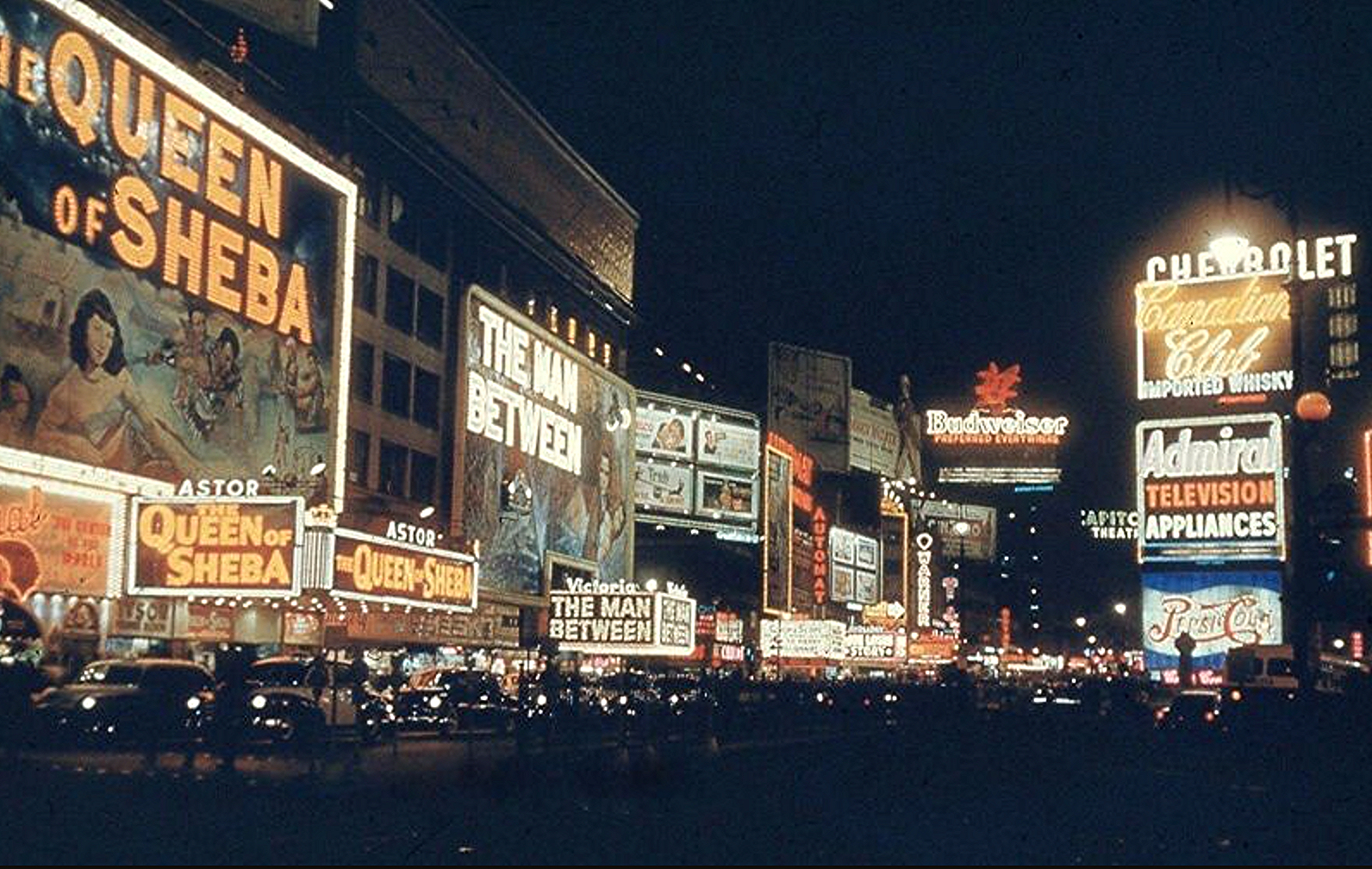
I moved to New York City 25 years ago. I came of age, fell in love, and became a father here. Seeing our City in so much pain breaks my heart.
Let’s fight for a future New York City that we can be proud of – together. Join us at https://t.co/TGnxwuBiHB pic.twitter.com/n9zxPybgbh
— Andrew Yang🧢🗽🇺🇸 (@AndrewYang) January 14, 2021

<div style="background:#fff;padding:7px;"><a href="https://hollywood-elsewhere.com/category/reviews/"><img src=
"https://hollywood-elsewhere.com/wp-content/uploads/2019/08/reviews.jpg"></a></div>
 Really Nice Ride
Really Nice RideTo my great surprise and delight, Christy Hall‘s Daddio, which I was remiss in not seeing during last year’s Telluride...
More » Live-Blogging “Bad Boys: Ride or Die”
Live-Blogging “Bad Boys: Ride or Die”7:45 pm: Okay, the initial light-hearted section (repartee, wedding, hospital, afterlife Joey Pants, healthy diet) was enjoyable, but Jesus, when...
More » One of the Better Apes Franchise Flicks
One of the Better Apes Franchise FlicksIt took me a full month to see Wes Ball and Josh Friedman‘s Kingdom of the Planet of the Apes...
More »
<div style="background:#fff;padding:7px;"><a href="https://hollywood-elsewhere.com/category/classic/"><img src="https://hollywood-elsewhere.com/wp-content/uploads/2019/08/heclassic-1-e1492633312403.jpg"></div>
- The Pull of Exceptional History
The Kamala surge is, I believe, mainly about two things — (a) people feeling lit up or joyful about being...
More »  If I Was Costner, I’d Probably Throw In The Towel
If I Was Costner, I’d Probably Throw In The TowelUnless Part Two of Kevin Costner‘s Horizon (Warner Bros., 8.16) somehow improves upon the sluggish initial installment and delivers something...
More » Delicious, Demonic Otto Gross
Delicious, Demonic Otto GrossFor me, A Dangerous Method (2011) is David Cronenberg‘s tastiest and wickedest film — intense, sexually upfront and occasionally arousing...
More »





